Archive for October 6th, 2009

Cheap TVs could be stolen
 (CNS): Police are looking for 12 flat screen TVs that were taken during a burglary in West Bay last month and are reminding the public that buying goods believed to be stolen is a serious offence which could result in jail time. Two suspects have been arrested for the burglary, which took place on 28 September. The RCIPS reports that a condo on North West Point Road was broken into and seven 40 inch, along with seven 32 inch Sony Bravia, LCD HDTV, flat screen TVs were taken.
(CNS): Police are looking for 12 flat screen TVs that were taken during a burglary in West Bay last month and are reminding the public that buying goods believed to be stolen is a serious offence which could result in jail time. Two suspects have been arrested for the burglary, which took place on 28 September. The RCIPS reports that a condo on North West Point Road was broken into and seven 40 inch, along with seven 32 inch Sony Bravia, LCD HDTV, flat screen TVs were taken.
These items were brand new and still in their boxes. Two of the TVs were recovered and investigations continue in locating the other 12 still missing.
On Sunday, 4 October, officers from the West Bay Police Station Criminal Investigation Department arrested a 23-year-old man on suspicion of burglary and the following day, Monday 5, a 22-year-old man was also arrested on suspicion of burglary.
West Bay CID officer DS Oremule is appealing to anyone who has been offered a TV at a low cost or knows of someone who is selling them to please come forward and inform the police, stating “handling stolen goods is a serious offence and what people don’t realize is that it can incur a fine and imprisonment. “
“If you are uncertain about the source of cheap goods, please do not buy them. Inform your local police station or call Crime Stoppers.” added DS Oremule.
Anyone with information about crime taking place in the Cayman Islands should contact their local police station or Crime Stoppers on 800-8477 (TIPS). All persons calling Crime Stoppers remain anonymous, and are eligible for a reward of up to $1000, should their information lead to an arrest or recovery of property/drugs.
.
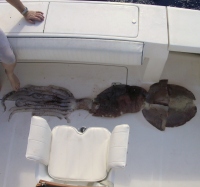
Six-foot squid found in Cayman waters
 (CNS): A very rare deep water squid, discovered by fishermen off the coast of Grand Cayman last month, is the same species, Asperoteuthis acanthoderma, as the specimen recovered off the coast of Little Cayman last year and one of only five of this species found in Atlantic waters so far. The latest find measured more than 6 feet in length (slightly less than the 24lbs 4oz creature found off Little Cayman in May 2008, which was over 7 feet long). It was discovered on Sunday, 27 September, by Dennis Denton, Stuart Mailer, and M. Christine RoseSmyth-Mailer. Photo by M. Christine RoseSmyth-Mailer
(CNS): A very rare deep water squid, discovered by fishermen off the coast of Grand Cayman last month, is the same species, Asperoteuthis acanthoderma, as the specimen recovered off the coast of Little Cayman last year and one of only five of this species found in Atlantic waters so far. The latest find measured more than 6 feet in length (slightly less than the 24lbs 4oz creature found off Little Cayman in May 2008, which was over 7 feet long). It was discovered on Sunday, 27 September, by Dennis Denton, Stuart Mailer, and M. Christine RoseSmyth-Mailer. Photo by M. Christine RoseSmyth-Mailer
According to Denton they were trolling along a weed line about 1½ miles north of the Rum Point channel when they noticed something in the water ahead of them. “As we went passed we realised it was a large squid, apparently dead, floating just below the surface.”
Recognising the scientific importance of this sighting, Denton marked the location with a GPS and brought in the fishing lines to have a closer look. He explained, “The animal was intact and much larger than we had thought so it was brought on board for better inspection and photographs.” After a call was made to the Department of Environment (DoE) confirming their interest in examining the squid further, it was placed in plastic bags, put on ice, and brought to shore.
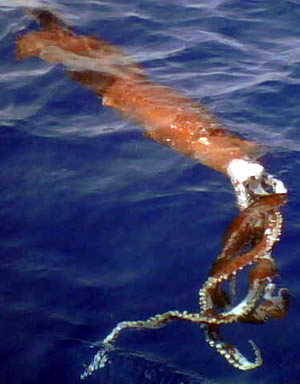 DoE Deputy Director for Research and Assessment Timothy Austin and Research Officer Janice Blumenthal collected the squid from Denton, took DNA samples and preserved the specimen. They then contacted cephalopod experts at the Smithsonian Institution, Mote Marine Laboratory, and the University of South Florida’s College of Marine Science to report the discovery. According to Dr. Heather Judkins, a cephalopod expert at the University of South Florida, the squid appears to be Asperoteuthis acanthoderma – a little-known deep sea dwelling species. (Right: Little Cayman squid, photo by Jose Williams, 2008)
DoE Deputy Director for Research and Assessment Timothy Austin and Research Officer Janice Blumenthal collected the squid from Denton, took DNA samples and preserved the specimen. They then contacted cephalopod experts at the Smithsonian Institution, Mote Marine Laboratory, and the University of South Florida’s College of Marine Science to report the discovery. According to Dr. Heather Judkins, a cephalopod expert at the University of South Florida, the squid appears to be Asperoteuthis acanthoderma – a little-known deep sea dwelling species. (Right: Little Cayman squid, photo by Jose Williams, 2008)
DoE’s Dr Blumenthal said “We were told that this squid is only the fifth animal of the species ever documented in the Atlantic Ocean, and it is in very good condition. Cephalopod experts such as Dr Judkins and Dr Clyde Roper at the Smithsonian Institution have expressed great interest in examining and dissecting the specimen.”
Dr Judkins explained that closer examination of the specimen and analysis of DNA samples would be used to confirm the identity of the species, and added, “Since this is a deep sea squid, almost everything is fair game for future study. We haven’t seen a male specimen yet for this region and to learn anything about their biology, ecology, and habitat would be extremely interesting to discover.”
Of the previous Asperoteuthis acanthoderma specimens, a handful have been documented in the Pacific Ocean but prior to 2006 none had ever been found in the Atlantic. Then during a ten month period between 2006 and 2007 four specimens were discovered – two recovered off the Florida Keys, one photographed near Grand Cayman, and one recovered near Little Cayman. Experts are still unsure why the species had never been seen in the Atlantic before 2006 and why four specimens were then found in such a short period.
Dr Judkins explained that discoveries might be due to fishermen now recognising the importance of reporting giant squid sightings to scientists, and that topography of the ocean floor might also play a role: in the Florida Keys and the Cayman Islands, she said, “there is a geological bump of sorts where the depth of the water goes from deep to shallow rather quickly and that may be bringing the squid closer to the surface.”
She continued, “There has been in-depth research done in the Broad Caribbean since the 1950s and to find a new large species shows us how little we have actually studied of the deeper waters of the Broad Caribbean. It shows that more fieldwork is needed and it can be a great benefit to cephalopod research.”
The Little Cayman squid was found May 2008 floating on the surface of the ocean about 5 miles south of Little Cayman by local fisherman Derren Burlington, who was taking part in the Brac Jackpot Fishing Tournament. It was transported to the Little Cayman Research Centre operated by the Central Caribbean Marine Institute (CCMI), where it was preserved and then shipped to the US.
Regarding the specimens collected in the Cayman Islands, Dr. Blumenthal said: “Clearly, there is much that is unknown regarding the oceanic animals that inhabit and move through Cayman waters – including deep water squid and their predators such as beaked whales and sperm whales.”
In November 2009, the Save Our Seas Foundation will carry out an OTEP funded project with the DoE to survey the waters surrounding the Cayman Islands for marine mammals, as well as sharks and rays. DoE officials also ask members of the public who spot large sea creatures (such as dolphins, whales, sharks, manta rays, adult turtles > 3 ft shell length, and of course giant squid) to make a report to the DoE marine sightings database by calling 949-8469 or emailing DoE@gov.ky.
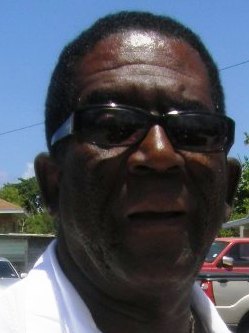
Dr Frank’s play to feature in Bahamas festival
 (CNS): The play written by former minister Dr Frank McField, One White One Black, will form part of the line up at the first annual Shakespeare in Paradise International Theatre Festival in the Bahamas this month. Produced by the Cayman National Cultural Foundation (CNCF), directed and designed by Henry Muttoo, the play stars Fritz McPherson and Michael McLaughlin. This is not the play’s first performance off the islands as CNCF took One White One Black to Carifesta X in Guyana last year where it was a box office and critical success.
(CNS): The play written by former minister Dr Frank McField, One White One Black, will form part of the line up at the first annual Shakespeare in Paradise International Theatre Festival in the Bahamas this month. Produced by the Cayman National Cultural Foundation (CNCF), directed and designed by Henry Muttoo, the play stars Fritz McPherson and Michael McLaughlin. This is not the play’s first performance off the islands as CNCF took One White One Black to Carifesta X in Guyana last year where it was a box office and critical success.
In his play, Frank McField explores relationships through the interaction of two down and out artists who have failed in their marriages and dreams of success. Through raw confrontation and an imaginative journey of role-playing, including playing each other’s wives, the two men rediscover themselves and emerge with a better understanding of life, love and friendship.
Following the performances in the Bahamas, One White One Black will be staged in Cayman at the Harquail Theatre beginning October 24. The play is CNCF’s 25th Anniversary Production. The anniversary will be celebrated beginning on October 23 with a special anniversary staging of the Annual National Arts and Culture Awards and continues with six performance of One White One Black.
The Shakespeare in Paradise festival takes place October 5 – 12 in historic New Providence. One White One Black has three performances during the festival.

Flood misery in India
 (BBC): The worst floods in more than 100 years have left behind a trail of death and destruction in five districts of the southern Indian state of Andhra Pradesh. BBC Hindi’s Omer Farooq reports from Rajoli village in Mehbubnagar district, which has emerged as the symbol of this devastation. The village, with a population of 15,000 and famous for its silk sari weavers, was completely flattened by the floods which hit in the dead of the night on 1 October. Almost a week later, shocked residents are yet to recover. Row after row of houses and shops turned to rubble, and kiosks were washed away and overturned by the raging flood waters from the nearby Tungabhadra river.
(BBC): The worst floods in more than 100 years have left behind a trail of death and destruction in five districts of the southern Indian state of Andhra Pradesh. BBC Hindi’s Omer Farooq reports from Rajoli village in Mehbubnagar district, which has emerged as the symbol of this devastation. The village, with a population of 15,000 and famous for its silk sari weavers, was completely flattened by the floods which hit in the dead of the night on 1 October. Almost a week later, shocked residents are yet to recover. Row after row of houses and shops turned to rubble, and kiosks were washed away and overturned by the raging flood waters from the nearby Tungabhadra river.

The demise of the dollar
 (The Independent): In the most profound financial change in recent Middle East history, Gulf Arabs are planning – along with China, Russia, Japan and France – to end dollar dealings for oil, moving instead to a basket of currencies including the Japanese yen and Chinese yuan, the euro, gold and a new, unified currency planned for nations in the Gulf Co-operation Council, including Saudi Arabia, Abu Dhabi, Kuwait and Qatar.Secret meetings have already been held by finance ministers and central bank governors in Russia, China, Japan and Brazil to work on the scheme, which will mean that oil will no longer be priced in dollars.
(The Independent): In the most profound financial change in recent Middle East history, Gulf Arabs are planning – along with China, Russia, Japan and France – to end dollar dealings for oil, moving instead to a basket of currencies including the Japanese yen and Chinese yuan, the euro, gold and a new, unified currency planned for nations in the Gulf Co-operation Council, including Saudi Arabia, Abu Dhabi, Kuwait and Qatar.Secret meetings have already been held by finance ministers and central bank governors in Russia, China, Japan and Brazil to work on the scheme, which will mean that oil will no longer be priced in dollars.
West Bay woman found
(CNS): Jana Ebanks, who was reported missing Monday evening, has been located, her father, Carlyle Ebanks, has said. Jana’s family launched an internet campaign, disseminating a flyer about her dissappearance that has been widely circulated. This morning the RCIPS reported that they had begun an investigation into the matter and that they were taking Jana’s disappearance extremely seriously. However, at approximately 11: 20 Tuesday morning, Mr Ebanks called CNS to say she had been found.
Anyone with information about crime taking place in the Cayman Islands should contact their local police station or Crime Stoppers on 800-8477 (TIPS). All persons calling crime stoppers remain anonymous, and are eligible for a reward of up to $1000, should their information lead to an arrest or recovery of property/drugs.

Don’t sell GOAP, says PPM
 (CNS): During his response to the government’s 2009/10 budget proposals, Leader of the Opposition Kurt Tibbetts criticized plans to sell off government assets. He said they were particularly concerned over the plans to sell the new government accommodation building and the sewerage plant. He noted that the new offices would have cut government expenditure dramatically, which was the reason why it was commissioned in the first place. The opposition leader also questioned how the government’s planned sell offs were influencing the budget statistics.
(CNS): During his response to the government’s 2009/10 budget proposals, Leader of the Opposition Kurt Tibbetts criticized plans to sell off government assets. He said they were particularly concerned over the plans to sell the new government accommodation building and the sewerage plant. He noted that the new offices would have cut government expenditure dramatically, which was the reason why it was commissioned in the first place. The opposition leader also questioned how the government’s planned sell offs were influencing the budget statistics.
Tibbetts drew the House’s attention to the communication between UK Overseas Territories Minister Chris Bryant and McKeeva Bush, in which he had raised his concerns about government’s sell-off plans. Bryant had written: "I would have concerns if CIG put long term sustainability at risk through a rapid depletion of Government assets, or through certain types of public private partnerships and I would want to take a close interest in any such proposals.”
The leader of the opposition said Bryant’s concerns were valid and shared by the PPM. “We too are concerned about putting the long term sustainability of the Cayman government’s finances at risk by the depletion of government assets. Long term sustainability is far more important than a quick fix aimed at eliminating the present deficit in one fiscal year,” Tibbetts added.
Selling the Government Office Accommodation Project (GOAP) for $50 million when there is $40 million worth of capital expenditure allocated this year for the ongoing construction of the project would not work, the opposition leader stated.
“That specific project is not only badly needed but it will pay for itself in ten years,” Tibbetts said. “On completion it will be one of, if not the most energy efficient buildings in the country. It cannot make sense for the government to dispose of it in any form or fashion.”
He added that the opposition believed a greater effort ought to have been made and should continue to be made by the government to reduce operational expenditure; that measures to reduce and ultimately eliminate the current deficit ought to be spread over three years rather than attempting to eliminate it in one fiscal year by resorting to drastic measures such as the sale of important assets like the new administration building.
Tibbetts also question what he described as “curious entries” in the Annual Plan and Estimates. “On page 285 of the AP&E there are two sections, namely ‘Capital Withdrawals from Statutory Authority/Government Owned Company’ totalling $22,427M and ‘Disposal of Government Assets’ totalling $71,457,569. These two amounts add up to $93.9M,” he observed. “When we look on page 311 of the AP&E on the ‘Cash Flow Statement’ for the year ending 30 June 2010, under cash flows from investing activities — there is a line which says ‘Proceeds from Sale of Non-Current Assets’ – $51,476M and another line which is ‘Capital Withdrawals from Investing Activities’ – $42,428M.”
He stated that the two items also total $93.9M and if the items on page 311 were the same as the items described on page 285, he questioned how the budget would have been affected if the $93.9M were not in the cash flow statement.
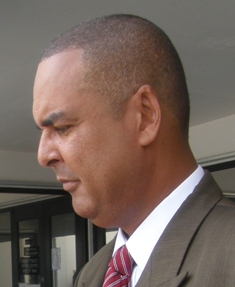
Cumber case file found
 (CNS): The legal case on which Rudolph Dixon relied when he gave Inspector Burman Scott advice on the night that Rudolph Evans was arrested was produced for the court by his defence team on Monday morning when they called Waide DaCosta as a witness. The local attorney told the jury that he remembered the case and that it had a considerable impact among local defence lawyers, as well as the police. Shown the file from the 1991 case involving Mervin Cumber’s arrest, he explained the circumstances and how the courts rejected the charge because the arresting officer had been instructed to arrest Cumber on a DUI rather than forming his own opinion that he had been driving while drunk.
(CNS): The legal case on which Rudolph Dixon relied when he gave Inspector Burman Scott advice on the night that Rudolph Evans was arrested was produced for the court by his defence team on Monday morning when they called Waide DaCosta as a witness. The local attorney told the jury that he remembered the case and that it had a considerable impact among local defence lawyers, as well as the police. Shown the file from the 1991 case involving Mervin Cumber’s arrest, he explained the circumstances and how the courts rejected the charge because the arresting officer had been instructed to arrest Cumber on a DUI rather than forming his own opinion that he had been driving while drunk.
Following the Crown’s cross examination of Dixon, who repeatedly denied the accusations that he was lying about the night in question, the defence called DaCosta. Jonathan Rose, Dixon’s defence lawyer, then produced the case file, which had been unearthed from the court records and was one of many that suffered considerable damage during the flooding associated with Hurricane Ivan. Asked if he recognised it, DaCosta confirmed it was the case referred to among the criminal defence bar as the Cumber 1 case and that it was well known.
He explained that after the case was thrown outby the Summary Court, from then on defence attorney’s looked very closely at any DUI arrests to make sure that the officers involved had done so based on their own satisfaction and were not directed or instructed by anyone else, as they knew that would form a way out for their clients — one that DaCosta himself said he was able to use to successfully clear charges for a client. He said the case was widely discussed andit put local officers on their Ps and Qs, too, when it came to such arrests. From then on, the attorney noted, the police worked harder to ensure they made lawful arrests on DUIs.
Despite the revelation regarding Cumber’s case following DaCosta’s testimony and the defence resting its case, prosecuting attorney, Andrew Radcliff QC, began the Crown’s closing submissions to the jury and persisted with its position that Dixon’s behaviour was “shameful, outrageous and the highest abuse of authority of office possible to imagine.”
He said that if the Crown’s case was correct, Dixon used his position to ensure a high ranking former colleague escaped prosecution. During his submissions, Radcliffe again had to talk to the jury about not being influenced by Operation Tempura, and despite that team’s involvement, they had to judge the case on the evidence alone. Whatever their views of Operation Tempura, Radcliffe said, they must put them aside.
He continued on the tack that Rudolph Evans and Dixon had been good friends and Dixon had tried to minimize that. He suggested that Dixon had, in a cowardly fashion, tried to blame Burman Scott for the release, and Radlciffe dismissed the Cumber 1 file saying it didn’t help Dixon’s case and accused him of changing his story. He implied, too, that former Commissioner Buel Braggs, who was never called as a witness, of being involved in a “whitewash” following PC Graham Summers report about Evans’ arrest, and said it was a dark and shameful episode when the Deputy Commissioner had put himself above the law.
“He thought the cosy relationship at the top of RCIPS would protect him as he had protected the former deputy commissioner Rudolph Evans, but he was wrong,” Radcliffe told the jury. “There is only one proper verdict and that is guilty.”
Dixon’s trial continues in Court Five at 10:00 am when Dixon’s defence counsel, Jonathan Rose, will present his closing submissions to the jury.

New democratic right may be tested with lottery
 (CNS): Cayman’s first people initiated referendum, a provision in the new Constitution, could be over the introduction of a national lottery. Gilbert McLean, former minister of health and latterly a talk show presenter on Rooster’s morning phone in show, has begun a petition that he will be presenting to government requesting a referendum over the creation of a local lottery to raise revenue for government and redirect the money which is currently illegally spent on numbers here in Cayman or spent in the US, in particular the Florida state lottery – the model McLean wants the Cayman lottery to follow if people vote for it.
(CNS): Cayman’s first people initiated referendum, a provision in the new Constitution, could be over the introduction of a national lottery. Gilbert McLean, former minister of health and latterly a talk show presenter on Rooster’s morning phone in show, has begun a petition that he will be presenting to government requesting a referendum over the creation of a local lottery to raise revenue for government and redirect the money which is currently illegally spent on numbers here in Cayman or spent in the US, in particular the Florida state lottery – the model McLean wants the Cayman lottery to follow if people vote for it.
Having long divided the community between those who are utterly opposed and those who believe we are missing an obvious and harmless revenue raising measure, McLean hopes to collect signatures from 25% of registered electors in order to trigger a people’s initiated referendum, as provided for in Cayman’s new Constitution, which will be implemented on 6 November of this year.
If the former politician can generate enough supporters, Cayman will find out once and for all if there are more people for the lottery or against — a question that has remained unanswered because support has been drowned out by the vociferous objections from the church.
McLean stated that a formal survey authorized by government around ten years ago, which included the private sector, estimated that illegal “numbers” gaming produced almost one million dollars per week, and some believe it might reasonably have doubled by now.
Asking for a straight forward ‘yes’ or ‘no’ ballot on the question, McLean will have to collect almost 3,500 signatures from registered voters to trigger the right to ask for a referendum. However, once collected, government will be obligated to set the ballot, and if a majority of voters say “yes”, the government will be free to establish a national lottery without necessarily losing support from those against it.
McLean said the petition was now in circulation collecting signatures of voters only, and said that on Monday morning’s Crosstalk Show, Bush stated he would accept the petition on the subject and take steps to cause a Referendum to be held if a majority of voters should say they want it. However, as noted, Bush’s permission will not be required if McLean can gain enough votes in accordance with section part IV section 70 of the Cayman Islands Constitution 2009.
Although gambling remains controversial, the problem for places that maintain a ban is that illegal gambling fills the void and criminalises not just those involved in its management but players as well. Attracting criminal gangs, disputes over territory and cash are often resolved with violence, while some argue that legalising will take it from the hands of criminals and enable government to direct profits to good causes.
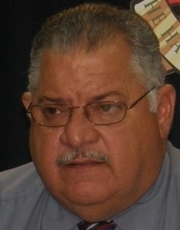
Kurt queries painful budget
 (CNS): The leader of the opposition told the Legislative Assembly this morning that the government’s over-optimistic budget will inflict pain on people and businesses. In his response to last week’s statement, Kurt Tibbetts also questioned the accuracy of the predictions and the need to try and eliminate the deficit in one year at the risk of Cayman’s competitive edge. He also queried why, when government was inflicting pain on the community with tax increases, public spending had been cut by only $5.5 million after government had said recently it intended to cut operating expenses by $89million.
(CNS): The leader of the opposition told the Legislative Assembly this morning that the government’s over-optimistic budget will inflict pain on people and businesses. In his response to last week’s statement, Kurt Tibbetts also questioned the accuracy of the predictions and the need to try and eliminate the deficit in one year at the risk of Cayman’s competitive edge. He also queried why, when government was inflicting pain on the community with tax increases, public spending had been cut by only $5.5 million after government had said recently it intended to cut operating expenses by $89million.
Tibbetts said the increase on import duties was not 2% as suggested but in real terms 10%, and could be devastating for small businesses, which will be required to pay increased work permit fees, a new Business Premises Fee of 10% of rent, a 10% increase in import duties on goods, as well as an increase in warehouse charges.
“Over the past four years, while the leader of government business sat on this side of the House, he and his colleagues never missed an opportunity to talk about the need to nurture and support small business in this country,” said Tibbetts, adding that it was ironic that they were introducing new revenue measures with no consideration to the fate of small businesses.
Tibbetts also noted that while he understood the motivation to produce a balanced budget to avoid the necessity to seek the UK’s approval for borrowing, trying to do it in a single year in a global recession was “overly ambitious, unrealistic and inflicts unnecessary pain on … the people of the country,” he said. It was unnecessary pain because the UK government was not insisting that the deficit be eliminated during the course of the present fiscal year, he maintained.
The opposition leader also lamented the new government’s failure to reduce public spending, despite promises made by the Bush publicly that he would reduce expenditure by $89 million this fiscal year. “The budget presented only shows a reduction of $5.5 million in operational expenditure compared to the previous fiscal year. So, despite all the criticisms that have been heaped on the shoulders of my government by the new administration … in this budget it is still very much a case of ‘business as usual’ as far as the costs of running the civil service are concerned,” Tibbetts added.
The PPM leader said that the budget was overly ambitious and required a positive movement of more than $100 million in government revenue in a mere 8 months, which in the midst of the present recessionary conditions was an unrealistic expectation.
“Revenue during the last fiscal year fell to $487 million against the original forecast of $528 million, a movement of $41 million, while expenditure exceeded the forecast by $47 million,” he added. “Against that background there must be real, worrying questions about actually how realistic are the present budget proposals.”
With the predictions made by the Financial Secretary’s Office during the last year of the PPM administration were revealed to be widely off the mark, Tibbetts asked how anyone could believe the predictions presented in the new budget, which he said also included new revenue measures with no previous model to base the predictions. “On what possible basis can we be satisfied that the forecasts of revenue now being made bear any relation to reality?” he asked, adding there was a distinct possibility that some of the new revenue measures would fail to realize the forecast revenue and detrimentally impact economic activity as well.
Tibbetts said the opposition questioned the viability of the budget and how realistic the projected revenues were, as well as the reliability of the predictions. He also asked what would be the impact of the new taxes on local business, the financial services sector and the average person, and what they would do to the cost of living. He noted that the rush to balance the budget could also undermine Cayman’s competitive edge if other jurisdictions were not increasing fees and the burden on the financial industry. The opposition leader noted a number of omissions from the budget which, he warned, would see the current administration need to return to the House forsupplementary finance if they were not addressed now.
Tibbetts also lamented the negative impact that government’s rush to criticise his administration had had worldwide. “There is no doubt that in his efforts to demonize, denigrate and discredit my administration the leader of government business greatly exaggerated the seriousness of the fiscal challenges the country faces and made a number of statements, some of which were picked up by the international media, which can only be described as reckless,” Tibbetts stated.
The opposition and PPM leader spoke for more than two hours before the independent MLA for North Side, Ezzard Miller, also contributed to the debate. While Miller said he supported a number of the government’s measures, he was very concerned about overdevelopment and the failure to reduce public spending by any significant amount, while at the same time increasing fees and revenues.
Miller made a number of alternative suggestions that government could have looked at that would not have been so painful. The North Side representative further stated that he believed the budget was overly optimistic and he did not think the revenue measures would necessarily generate the projected income.
The House was adjourned on Monday afternoon until 10 o’clock on Wednesday when the financial secretary will offer his responses to the debate before the Finance Committee will begin sitting to examine the extensive budget proposals. At that point MLAs have an opportunity to question the government’s spending plans in detail and address some of the missing outputs noted by the leader of the opposition, among other issues.